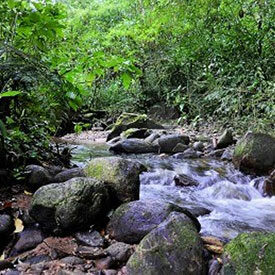Extending into Brazil, Paraguay and Argentina, the Atlantic Forest is a 1,500-square-mile stretch of land devastated by recent deforestation (the removal of a forest or a group of trees, often for real estate development or to use the timber for wood-based products). While estimates say more than 95% of the region has been deforested, one company, Guayakí, has begun to reverse the trend. Its weapon of choice: beverages.
A ‘Restoration’ Business Model
Started by five friends from California, Guayakí specializes in Yerba Mate. Made from the leaves of the South American rainforest holly tree, naturally caffeinated Yerba Mate beverages are touted as healthy and energizing drinks that can be prepared like a tea, percolated in a coffee brewer or consumed cold in cans. And while nature-inspired drinks are nothing new to thirsty, health-conscious Americans, Guayakí’s business model is unique. Its entire operations are centered on what the company calls the market-driven restoration business model. “We needed to build a new business model that reflected our philosophy on how business should be done — one that gives to the earth,” explains David Karr, co-founder and vice president of marketing. “We’re passionate about people voting with their dollars. We believe business can drive environmental and social change.”
Leveraging this model, Guayakí wants to accomplish a few more things besides making a profit while selling beverages. One of its missions is to “steward and restore 200,000 acres of South American Atlantic Rainforest and create over 1,000 living wage [the minimum income necessary for a worker to meet basic needs] jobs by 2020,” says Karr. It is accomplishing this through various means, including partnering with farmers to harvest sustainably and creating native hardwood nurseries.
Guayakí’s dedication to the triple bottom line — a phrase used when a company accounts for financial, social and environmental health — has infiltrated every aspect of its business. In addition to its work to restore the rainforest, the company also employs many other strategies, including using eco-friendly packaging material and paper supplies, powering up its operation via solar energy and working exclusively with certified organic farmers.
Beyond beverages, Guayakí is in the business of sustainability. Sustainability is a buzzword in the marketplace today, and companies large and small are scrambling to find ways to become more sustainable by incorporating strategies to protect the environment, people and the company’s own profits. Consumers, including teenagers, yield tremendous influence on how businesses operate and are helping to encourage the sustainability movement.
Guayakí is a partner with Teens Turning Green, an organization comprised of young people “with a passion to change the world.” The nonprofit primarily serves as an educational and advocacy group, aimed at equipping and mobilizing youth to make wise buying choices and impact the business world by urging companies to adopt and honestly uphold their environmental and social practices. “As a consumer, the power you have to vote with your dollars is tremendous. That is at the heart of what we do at Teens Turning Green,” says Erin Schrode, a student at New York University, who co-founded the group with her mother eight years ago at the age of 13. The organization facilitates a number of projects and events throughout the year, including its Project Green Challenge. Project Green Challenge assigns daily challenges to college students throughout the world during the month of October. Each challenge has a specific theme, and students earn points and a chance to win daily prizes.
Schrode has seen a general upswing in the number of businesses interested in implementing environmentally and socially responsible practices. She notes two drivers: One is “visionary CEOs driven by the most honest of intentions to create environmentally and socially responsible businesses. But there is also a change in consumer desires. Businesses can’t afford not to jump on the bandwagon [if they want to have] a competitive and economic edge.”
Sustainable and Profitable
Not all businesses waving the pro-environment banner are created the same, however. Some, such as Guayakí, have a more holistic strategy. These types of companies incorporate a “systems thinking approach to their business,” says Schrode, adding that other business owners “tack it on” by making small, incremental changes in order to avert public reproach or improve their competitive advantage in the marketplace.
While there aren’t specific practices that serve as the hallmarks of a sustainable business, “[companies] that truly live and breathe this look across all areas of their businesses. Their eco-practices are not in one silo,” notes Schrode.
As a consumer, you can verify a company’s sustainability claims. One way is to search out and purchase from B Corporations. Certified by the nonprofit agency B Lab, more than 600 companies have met its standards for social and environmental performance, accountability and transparency, earning them the designation of a B Corporation. B Lab aims to “redefine success in business.”
It’s also important to remember, from a business perspective, that the triple bottom line includes a focus on profitability: At the end of the day, sustainable companies still want to make money. Has Guayakí’s emphasis on environmental and social integrity negatively impacted profits? The model has required some sacrifice, Karr admits. Standards like paying fair wages and using exclusively organic products come with a higher price tag. Founded in 1996, Karr estimates it took much longer to initially reach profitability employing socially and environmentally beneficial strategies. However, in the end, “We are proving to the world that we are running a profitable business, we are operating sustainably and we are driving restoration [in the environment],” says Karr. “Everyone buying our product is making our business model work.”
Related Links
Conversation Starters
What is sustainability?
How does Guayakí’s business model affect the Atlantic Forest? In what other ways is Guayakí promoting sustainable business practices?
How does the consumer influence sustainability in business?



